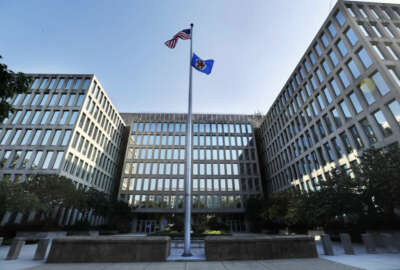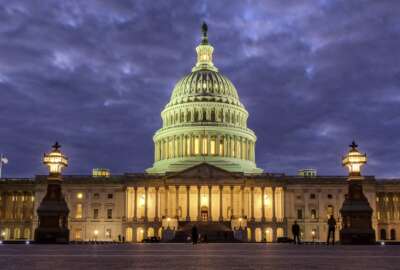Financial Crimes: Securing the National Threat
The United States has leveraged its financial and economic power to influence a range of global security threats and concerns from terrorism to international...
wfedstaff | April 17, 2015 4:08 pm
The United States has leveraged its financial and economic power to influence a range of global security threats and concerns from terrorism to international organized crime the world over. Here the latest insights from the Honorable Juan Zarate, noted security advisor and Frank Waikart, former senior advisor on terrorist finance discuss how the United States can continue to isolate rogue and illicit financial activity to advance its national security.
Guests:
Honorable Juan Zarate, Senior Adviser, Transnational Threats Project and Homeland Security and Counterterrorism Program, CSIS
Frank Waikart, Financial Security Strategist, Deloitte Financial Advisory Services, LLP
Show highlights:
• The current climate of the global financial industry and how it affects US security interests
• The consequences of financial crimes and how it impacts the US economy
• How countries like China and Russia assert their economic power to affect geopolitics and US financial security interests
• Future challenges and opportunities changing the geo-economic landscape of American security
The following is a full transcript of FedCentral’ s interview with Juan Zarate, a noted national security expert, and Frank Waikart, Financial Crimes Advisor, with Deloitte Financial Advisory Services LLP conducted by Jane Norris on September 6, 2012. To listen to the full interview go to http://www.deloitte.com/us/fedcentral.

Welcome to FedCentral brought to you by Deloitte, a program where executives and federal government leaders talk about the issues and initiatives that are making a real impact on the business of government today to help government help America.
Today we’re going to be talking about financial crimes. The United States has leveraged its financial and economic power to influence a range of global security threats and concerns from terrorism to international organized crime the world over, but how can the United States continue to isolate rogue and illicit financial activity to advance its national security? Joining us today to discuss how financial crimes can compromise national security in the federal government is the Honorable Juan Zarate. Juan is a former senior White House and Treasury official and noted national security expert. He currently serves as a senior advisor at the Center for Strategic and International Studies. He also serves as a Senior national security analyst for CBS News and is a visiting lecturer of law at Harvard Law School.
Frank Waikart is with Deloitte Financial Advisory Services, LLP and a former senior advisor on terrorist finance with the FBI where he specializes in terrorism, financial fraud, money laundering, and the post-9/11 response of intelligence in law enforcement to the terrorist financing threats and by the way, both of these gentlemen worked together in the post-9/11 period in government. Gentlemen, thanks very much for joining us on the show.
Juan Zarate
Thank you, pleasure.
Frank Waikart
Thank you very much.
Jane Norris
Nice to talk to both of you. Juan, let’s start with you. So tell us a little about the current climate of the global financial industry and how it affects US security interests.
Juan Zarate
Well, it’s very interesting because I think what we’ve seen is an evolution over the last ten years where you not only have a lot of intense pressure and intention from the US government and other governments around the world on preventing illicit financial activity, everything from terrorist financing to the work of organized crime, but you’ve had in the private sector a real focus on trying to weed out illegitimate and illicit financial activity and what you’ve had is really a blending of activities where the federal government from the US perspective has done a lot with law enforcement, intelligence, administrative tools from the Treasury, and other tools to really try to sanction and enforce the laws that we have in place and that we’ve put in place in the post-9/11 environment.
From the private sector perspective, there has been an increase in diligence on compliance not only those laws but also compliance with reputational risks, preserving reputation so that banks and other institutions don’t find themselves dealing with nefarious actors, don’t find their names in the front pages of The Wall Street Journal, Financial Times for having violated sanctions or laws, or having facilitated activities which at the end of the day proved to be an international security risk. And so in that convergence, you have a very interesting environment where not just the government but the private sector is also worried about illicit financial activity.
Jane Norris
And does the government work with private industry to make the financial crimes process a little more transparent or cohesive?
Frank Waikart
It’s absolutely essential, Jane, that the private sector and the government work together. I mean, the tools that the private sector brings, it’s worldwide reach, it’s analytical capabilities, it’s a knowledge of financial institutions—you marry that with the responsibility and the enthusiasm, the focus of the federal government and you have a powerful tool to attack financial crimes. Financial crimes cover everything from threat to finance to terrorism. You’ve got trafficking in humans, you’ve got narcotics. You have proliferation, everything circles back to the money. The bad guys need to get paid, they need to move the money whether they’re dealing in drugs or human beings.
Jane Norris
So what are the consequences of financial crimes? I think we are aware that this is going on. I know that we know that there are illicit activities. It’s people who would seek to do harm to the United States and how they are performing, so how are we impacted by that on a day-to-day basis?
Read a pdf version of the transcript>>.
Copyright © 2024 Federal News Network. All rights reserved. This website is not intended for users located within the European Economic Area.





